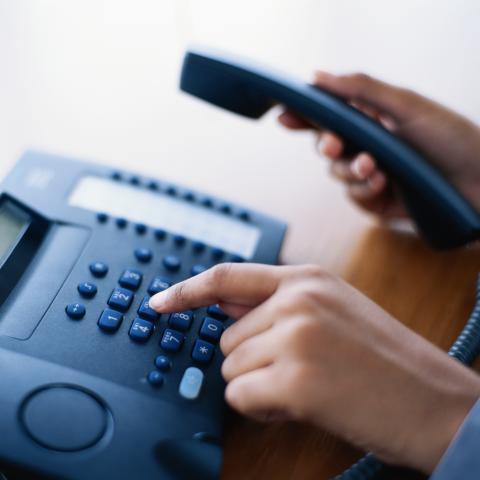
Speaking on the phone can be stressful enough in your own language, let alone in a foreign language!
Even after you’re able to have face-to-face conversations with native speakers, you’ll find that communicating over the phone is rather difficult. Phone calls are different from in-person conversations in that you can’t rely on body gestures or facial expressions to help get your point across or to understand what the other person is trying to say.
Talking on the phone in Japanese may be especially difficult. You’ll need to memorize a specific set of Japanese phone phrases, as we use Honorific language, or 敬語 (Keigo), for most of our phone conversations. The exception is when we’re just having a casual chat with friends or family.
But don’t worry! There are only a few patterns to learn and you’ll see them all in this article from JapanesePod101.com.

Let’s learn some useful Japanese phone call phrases!
 Table of Contents
Table of Contents
- Picking up the Phone
- Introducing Yourself
- Stating the Reason for Your Call
- Asking to Speak to Someone
- Responding to the Caller / Asking Someone to Wait
- Leaving a Message
- Asking for Clarification
- Ending the Phone Call
- Sample Phone Conversations
- Conclusion
1. Picking up the Phone
First impressions are critical! Let’s start by looking at some Japanese phone call phrases you could use to answer the phone.
1. もしもし。
Romanization: Moshimoshi.
English: “Hello.”
This is the most common way to answer a phone call in Japanese.
もし もし (moshimoshi) comes from the word 申す もうす (mōsu), which is “to say” in a humble manner. You can also add the word はい (hai), meaning “yes,” in front:
- はい、もしもし。 (Hai, moshimoshi.) – “Yes, hello.”
Moshimoshi is typically used by the receiver to answer the phone, but the caller may also say moshimoshi before continuing in order to make sure the other person can hear.
2. はい、___です。
Romanization: Hai, ___ desu.
English: “Yes, this is ___.” [Polite]
When you pick up the phone, you say はい (hai), meaning “yes,” and then state who is speaking.
To give your name, make sure to place the general and polite predicate -です (-desu) at the end. Keep in mind that you should normally give your family name (as opposed to only your first name) when answering the phone in Japanese.
3. はい、___でございます。
Romanization: Hai, ___ de gozaimasu.
English: “Yes, this is ___.” [Very polite]
This phrase is very polite and often used in business contexts, such as when answering a company phone.
4. どちら様でしょうか。
Romanization: Dochira-sama deshō ka.
English: “Who is this?” [Very polite]
This phrase can be used later on when you want to know who’s calling, but some people ask this when they first receive a call. You can make the phrase even more polite by placing this in front:
- 失礼ですが… (Shitsurei desu ga…) – “Excuse me, but…”
Examples
- はい、もしもし、田中です。
Hai, moshimoshi, Tanaka desu.
“Yes, hello, Tanaka is speaking.”
- はい、ABC株式会社でございます。
Hai, ABC kabushikigaisha de gozaimasu.
“Yes, this is ABC company.”
- もしもし、鈴木です。どちら様でしょうか。
Moshimoshi, Suzuki desu. Dochira-sama deshō ka.
“Hello, this is Suzuki. Who’s calling?”

もしもし (moshimoshi) – “hello” on the phone
2. Introducing Yourself
When you make a phone call in Japanese, it’s expected that you introduce yourself by stating your name and/or the company you’re representing.
1. いつもお世話になっております。
Romanization: Itsumo o-sewa ni natte orimasu.
English: “Thank you for always being favorable.” / “It has always been a pleasure to work with you.”
Literally: “You always take care of me.”
This is a common Japanese phrase that does not translate well into other languages. It’s most often used in business communications, and it can be said by either the caller or the receiver.
- → To learn more untranslatable Japanese words, please see our article Untranslatable Japanese Words: Let’s Talk Like a Native!
2. 私は___です。
Romanization: Watashi wa ___ desu.
English: “This is ___.” [Polite]
This phrase literally means, “I am ___.” It’s a general and polite way to introduce yourself over the phone.
If you’re calling a close friend or family member, you can say:
- ___ だよ。 (___ da yo.) – “It’s ___.”
In this case, you can omit the subject (私 watashi).
3. 私は___と申します。
Romanization: Watashi wa ___ to mōshimasu.
English: “This is ___.” [Very polite]
This is a formal expression that denotes humbleness and respect. It’s often used in business situations and other official contexts.
4. 私は___の___です/と申します。
Romanization: Watashi wa ___ no ___ desu / to mōshimasu.
English: “I am ___ from ___.”
This is the phrase you would use if you were calling as a business person or staff member of a company/organization. In Japanese culture, the group is often considered more important than the individual (collectivism) and a business person or staff member is seen as a representative of their company. Thus, telling where you belong is important.
Examples
- いつもお世話になっております。本田です。
Itsumo o-sewa ni natte orimasu. Honda desu.
“Thank you for your continued support. This is Honda.”
- もしもし、私だよ。
Moshimoshi, watashi da yo.
“Hello, it’s me.” [Very casual]
- 私はXYZ株式会社の山本と申します。
Watashi wa XYZ kabushikigaisha no Yamamoto to mōshimasu.
“This is Yamamoto from XYZ company.”
3. Stating the Reason for Your Call
Once the greetings and introductions are over, it’s time to let the other person know why you’re calling. Below are some phone phrases in Japanese for making reservations, asking for information, and more!
1. ___ の予約をしたくて電話しました。
Romanization: ___ no yoyaku o shitakute denwa shimashita.
English: “I’m calling because I’d like to make a reservation for ___.”
This Japanese phone call phrase is useful for booking a table at a restaurant, hair salon, etc.
Vocabulary:
- 予約をする (yoyaku o suru) – “to book” / “to make a reservation”
- 電話する (denwa suru) – “to call”
2. ___について確認したくて電話しました。
Romanization: ___ni tsuite kakunin shitakute denwa shimashita.
English: “I’m calling because I’d like to confirm about ___.”
You can use this phrase when you want to check something. For example, you might say this while calling customer service to see if you can return an item or while calling a restaurant to see if you can change your reservation.
Vocabulary
- 確認する (kakunin suru) – “to check” / “to confirm”
3. ___のサポートが必要なので電話しました。
Romanization: ___ no sapōto ga hitsuyō na node denwa shimashita.
English: “I’m calling because I need support for ___.”
This phrase is useful for situations where you need some support. You might say this when calling a help center for software services or talking with a customer service representative for info on setting up a gadget.
4. 着信があったので折り返し電話しました。
Romanization: Chakushin ga atta node orikaeshi denwa shimashita.
English: “I received an incoming call, so I called back.”
When you call someone back, just give your name and use this phrase.
Vocabulary
- 着信 (chakushin) – “incoming call”
- 折り返し電話する (orikaeshi denwa suru) – “call back”
Examples
- もしもし、マッサージの予約をしたくて電話しました。
Moshimoshi, massāji no yoyaku o shitakute denwa shimashita.
“Hello, I’m calling because I’d like to make a booking for a massage.”
- 自然災害によるキャンセル料について確認したくて電話しました。
Shizen saigai ni yoru kyanseruryō ni tsuite kakunin shitakute denwa shimashita.
“I’m calling because I’d like to check about a cancelation fee due to a natural disaster.”
- 着信があったので折り返し電話したよ。何だった?
Chakushin ga atta node orikaeshi denwa shita yo. Nan datta?
“I received an incoming call and I’m calling you back. What was it?” [Very casual]

着信があったので折り返し電話しました。(Chakushin ga atta node orikaeshi denwa shimashita.)
“I received an incoming call, so I called back.”
4. Asking to Speak to Someone
What if the person who answers the phone is not who you intended to call? You can use the following phrases to ask if you can be transferred to the right person.
1. ___ さんをお願いします。
Romanization: ___-san o onegai shimasu.
English: “Mr./Ms. ___, please.”
This is a useful phrase that’s simple yet still polite. By stating the name of the person you want to speak to, it implies to the receiver that you’d like to be connected to him/her.
さん (san) is a general and polite Japanese honorific (敬称 keishō) that is placed after one’s name. It’s normally used after a family name (苗字 myōji / 姓 sei) in formal settings, but it can also be used after a given name (名 mei).
If we’re calling someone of a higher rank than us or just want to show more respect, we use 様 (sama). For example, we might use this when calling customers, clients, or guests.
2. ___ さんはいますか。
Romanization: ___-san wa imasu ka.
English: “Is Mr./Ms. ___ there?” [Polite]
This is a very simple and casually polite phrase.
3. ___ さんはいらっしゃいますか。
Romanization: ___-san wa irasshaimasu ka.
English: “Is Mr./Ms. ___ there?” [Very polite]
This phrase is even more polite and respectful, which makes it ideal for use in formal situations. Use this phrase if you’re calling someone who is superior to you or deserving of great respect.
4. ___ さんにつないでいただけますか。
Romanization: ___-san ni tsunaide itadakemasu ka.
English: “Could you connect with Mr./Ms. ___?”
This is another polite way you can ask to speak to someone.
Examples
- 吉田と申します。原田様はいらっしゃいますか。
Yoshida to mōshimasu. Harada-sama wa irasshaimasu ka.
“I am Yoshida. Is Mr. Harada there?” [Very polite and respectful]
- もしもし、お父さん?お母さんいる?
Moshimoshi, o-tō-san? O-kā-san iru?
“Hello, Dad? Is Mom there?” [Very casual]
- 人事部の中田さんにつないでいただけますか。
Jinjibu no Nakata-san ni tsunaide itadakemasu ka.
“Could you please connect me with Mr. Nakata of the Human Resources Department?”
5. Responding to the Caller / Asking Someone to Wait
If you’re the receiver and have been asked to connect someone, you may need to put the caller on hold for a moment and inform them if the person they’re inquiring after is not available. Here are some phrases you can use to do so politely:
1. 申し訳ございません、___はただ今外出中です。
Romanization: Mōshiwake gozaimasen, ___ wa tadaima gaishutsuchū desu.
English: “I’m sorry, ___ is out of office now.”
This phrase is often used in business situations. It is proper Japanese phone call etiquette to apologize to the caller when the person they’re asking for is not in office.
In Japanese business settings, you don’t use honorifics (such as さん san) when saying a colleague’s name.
2. ___は本日お休みをいただいております。
Romanization: ___ wa honjitsu o-yasumi o itadaite orimasu.
English: “___ is off today.” [Very polite]
This is a humbly respectful and very polite expression to use when the person they want is absent.
3. 確認いたします、少々お待ちください。
Romanization: Kakunin itashimasu, shōshō o-machi kudasai.
English: “I will check, please hold for a moment.”
When you need to check something and want the caller to wait for a moment, you can use this polite phrase.
4. ___へおつなぎいたしますので、少々お待ちくださいませ。
Romanization: ___ e o-tsunagi itashimasu node, shōshō o-machi kudasai mase.
English: “I will put you through to ___, please hold for a moment.”
You would use this phrase before transferring the caller to someone.
Examples
- 申し訳ございません、山田は本日お休みをいただいております。
Mōshiwake gozaimasen, Yamada wa honjitsu o-yasumi o itadaite orimasu.
“I’m sorry, Yamada is off today.”
- 確認するね、ちょっと待って。
Kakunin suru ne, chotto matte.
“I’ll check, one moment.” [Very casual]
- 上田へおつなぎいたしますので、少々お待ちくださいませ。
Ueda e o-tsunagi itashimasu node, shōshō o-machi kudasai mase.
“I will transfer you to Ueda, please hold for a moment.”

少々お待ちください。 (Shōshō o-machi kudasai) – “Please wait a moment.”
6. Leaving a Message
Especially during a business phone call, you might need to leave a message if the person you’re trying to reach is unavailable. Below are a few different ways you could do this.
1. 伝言をお願いできますか。
Romanization: Dengon o onegai dekimasu ka.
English: “Can I leave a message?”
Use this simple phrase when you want to leave a message.
Vocabulary
- 伝言 (dengon) – “a message”
2. ___さんに、私から電話があったと伝えていただけますか。
Romanization: ___-san ni, watashi kara denwa ga atta to tsutaete itadakemasu ka.
English: “Could you please tell Mr./Ms. ___ that I called?”
When you just want to let the person know that you have called, this phrase is useful and polite.
3. ___さんに、私へ折り返し電話するようお伝えいただけますか。
Romanization: ___-san ni, watashi e orikaeshi denwa suru yō o-tsutae itadakemasu ka.
English: “Could you please tell Mr./Ms. ___ to call me back?”
This is a polite way to ask for a call back.
Examples
- 山口さんへ伝言をお願いできますか。
Yamaguchi-san e dengon o onegai dekimasu ka.
“Could you give a message to Mr. Yamaguchi?”
- まゆみに、私から電話があったと伝えておいてね。
Mayumi ni, watashi kara denwa ga atta to tsutaete oite ne.
“Can you tell Mayumi that I called?” [Very casual]
- 中村さんに、明日私へ折り返し電話するようお伝えいただけますか。
Nakamura-san ni, ashita watashi e orikaeshi denwa suru yō o-tsutae itadakemasu ka.
“Could you please tell Mr. Nakamura to call me back tomorrow?”
7. Asking for Clarification
As a non-native speaker, you might need to ask for clarification at some point during your Japanese phone call conversation. There are a few polite phrases you can use.
1. すみません、もう一度言ってください。
Romanization: Sumimasen, mō ichi-do itte kudasai.
English: “I’m sorry, could you repeat again?”
If you can’t hear what the other person is saying, you can use this phrase to ask them to repeat.
Vocabulary
- すみません (sumimasen) – “sorry” / “excuse me”
- もう一度 (mō ichi-do) – “once again”
2. すみません、聞こえにくいです。
Romanization: Sumimasen, kikoenikui desu.
English: “I’m sorry, but it’s hard to hear you.”
You can use this phrase to tell the other person that you’re not hearing them well.
3. 電波が悪いようです。
Romanization: Denpa ga warui yō desu.
English: “It seems there is a bad signal.”
If you’re experiencing a bad connection, you can use this phrase to inform the other person.
Vocabulary
- 電波 (denpa) – “electric wave,” but it usually refers to a cell phone signal
4. もう一度ゆっくりおっしゃってくださいますか。
Romanization: Mō ichi-do yukkuri osshatte kudasaimasu ka.
English: “Could you please say it again slowly?”
This is a very polite phrase you can use if you need them to repeat what they said more slowly.
Vocabulary
- おっしゃる (ossharu) – the respectful version of 言う (iu), meaning “say”
5. 確認のため繰り返しますと、…
Romanization: Kakunin no tame kurikaeshimasu to, …
English: “Let me repeat it to double check…”
Use this phrase when you want to double check something, or to make sure you or the receiver understand things correctly.
Vocabulary
- 確認 (kakunin) – “check” / “conform”
- 繰り返す (kurikaesu) – “repeat”
Examples
- すみません、聞こえにくいです。もう一度言ってください。
Sumimasen, kikoenikui desu. Mō ichi-do itte kudasai.
“I’m sorry, but it’s hard to hear you. Could you say that again?”
- ごめん、聞こえなかった。もう一度ゆっくり言ってくれる?
Gomen, kikoenakatta. Mō ichi-do yukkuri itte kureru?
“Sorry, I couldn’t hear you. Can you say that again slowly?” [Very casual]
- 確認のため繰り返しますと、私の電話番号は012334567です。
Kakunin no tame kurikaeshimasu to, watashi no denwa bangō wa 012334567 desu.
“Let me repeat it to double check…my phone number is 012334567.”

もう一度言ってください。 (Mō ichi-do itte kudasai.) – “Please repeat again.”
8. Ending the Phone Call
Finally, let’s go over a few different ways of ending a phone call in Japanese.
1. はい、わかりました。
Romanization: Hai, wakarimashita.
English: “Yes, I understood.”
This phrase can be used during the conversation, but saying it at the end shows that you understood the conversation as a whole. In casual conversations, you can replace はい (hai) with:
- うん (un) – “yeah”
2. かしこまりました。
Romanization: Kashikomarimashita.
English: “Understood.” / “Certainly.”
This phrase is a humble and very polite version of わかりました (wakarimashita). It’s often used in business situations as well as in communications toward customers and guests.
3. よろしくお願いいたします。
Romanization: Yoroshiku onegai itashimasu.
This is one of the most frequently used untranslatable Japanese phrases. We often use it in business settings, especially when closing a conversation or ending an email.
It literally translates as “Suitable favor please,” but it can have various meanings depending on the situation. For example:
- “Nice to meet you”
- “Best regards”
- “Favorably please”
- “Please take care of me”
In phone conversations, it’s used as a final greeting.
4. 失礼します。
Romanization: Shitsurei shimasu.
This is another common untranslatable Japanese phrase used in formal situations.
The literal translation is: “I do rude/impolite.” But when ending a phone call or leaving an office/meeting room, it means: “May I be excused.”
失礼いたします(shitsurei itashimasu) is even more polite.
Examples
- かしこまりました。では、失礼いたします。
Kashikomarimashita. Dewa, shitsurei itashimasu.
“Certainly. Please excuse me now.”
- うん、わかったよ。じゃあね。
Un, wakatta yo. Jā ne.
“Yeah, understood. Bye then.” [Very casual]
- 明日の会議の件かしこまりました。よろしくお願いいたします。
Ashita no kaigi no ken kashikomarimashita. Yoroshiku onegai itashimasu.
“I understood about the meeting tomorrow. Favorably please.”
9. Sample Phone Conversations
Now that we’ve introduced you to several useful phone call phrases, it’s time to see them in action. Below, you’ll find two sample phone conversations: one casual and one formal.
1 – Casual Conversation (Two Friends)
A:
もしもし、まりこ?
Moshimoshi, Mariko?
“Hello, Mariko?”
B:
もしもし、かなちゃん! どうしたの?
Moshimoshi, Kana-chan! Dō shita no?
“Hello, Kana! What’s up?”
A:
今週の土曜日空いてる?
Konshū no do-yōbi aite ru?
“Are you free on Saturday this weekend?”
B:
うん、午後からなら暇だよ。
Un, gogo kara nara hima da yo.
“Yeah, I’m free from the afternoon.”
A:
___の映画の無料券もらったから、一緒に行きたいと思って。どうかな?
___ no eiga no muryōken moratta kara, issho ni ikitai to omotte. Dō ka na?
“I got the free movie tickets for ___ and I’d like to go with you. What do you think?”
B:
ありがとう。いいね、見に行こう!
Arigatō. Ii ne, mi ni ikō!
“Thank you. That’s nice, let’s go watch!”
A:
じゃあ、2時に新宿駅東口で待ち合わせしよう。
Jā, ni-ji ni Shinjuku Eki higashiguchi de machiawase shiyō.
“Well, then let’s meet at the east exit of Shinjuku Station at two o’clock.”
B:
うん、わかった。土曜日の2時に新宿駅ね。
Un, wakatta. Do-yōbi no ni-ji ni Shinjuku Eki ne.
“Okay, noted. At Shinjuku Station at two o’clock on Saturday.”
A:
じゃあ土曜日にね。バイバイ。
Jā do-yōbi ni ne. Baibai.
“See you on Saturday, then. Bye.”
B:
うん、よろしくね。バイバイ。
Un, yoroshiku ne. Baibai.
“Yeah, thank you. Bye.”
2 – Formal Conversation (Calling a Client’s Office)
A:
はい、XYZ株式会社でございます。
Hai, XYZ kabushikigaisha de gozaimasu.
“Hello, this is XYZ company.”
B:
もしもし、いつもお世話になっております。私はABC株式会社の田中と申します。
Moshimoshi, itsumo o-sewa ni natte orimasu. Watashi wa ABC kabushikigaisha no Tanaka to mōshimasu.
“Hello, it’s always a pleasure to work with you. I am Tanaka from ABC company.”
A:
いつもお世話になっております。ご用件は何でしょうか。
Itsumo o-sewa ni natte orimasu. Go-yōken wa nan deshō ka.
“Thank you for your continued support, too. How can I help you?”
B:
国際部の上野さんにつないでいただけますか。
Kokusaibu no Ueno-san ni tsunaide itadakemasu ka.
“Could you connect me with Mr. Ueno of the International Department?”
A:
確認いたします、少々お待ちくださいませ。
Kakunin itashimasu, shōshō o-machi kudasai mase.
“I will check, please hold for a moment.”
— a minute later —
A:
申し訳ございません、上野はただ今外出中です。ご伝言を承りましょうか。
Mōshiwake gozaimasen, Ueno wa tadaima gaishutsuchū desu. Go-dengon o uketamawarimashō ka.
“I’m sorry, Ueno is out of office now. Would you like to leave a message?”
B:
はい、お願いします。送り状の件について確認したくて電話しました。上野さんに、明日私へ折り返し電話するようお伝えいただけますか。
Hai, onegai shimasu. Okurijō no ken ni tsuite kakunin shitakute denwa shimashita. Ueno-san ni, ashita watashi e orikaeshi denwa suru yō o-tsutae itadakemasu ka.
“Yes, please. I called because I’d like to check about the invoice. Could you please tell Mr. Ueno to call me back tomorrow?”
A:
かしこまりました。上野へ田中様からのご伝言をお伝えいたします。
Kashikomarimashita. Ueno e Tanaka-sama kara no go-dengon o o-tsutae itashimasu.
“Certainly. I will send the message from Mr. Tanaka to Ueno.”
B:
ありがごうございます。よろしくお願いいたします。では、失礼いたします。
Arigatō gozaimasu. Yoroshiku onegai itashimasu. Dewa, shitsurei itashimasu.
“Thank you. Please do so. May I be excused now?”
A:
お電話ありがとうございました。失礼いたします。
O-denwa arigatō gozaimashita. Shitsurei itashimasu.
“Thank you for calling. Goodbye.”
10. Conclusion
In this article, we introduced the most useful and frequently used Japanese phone call phrases. Once you master this list of polite expressions, you can make or receive your next call in Japanese with confidence—whether you’re chatting with a friend or getting info from a customer service rep.
If you would like to learn more about the Japanese language and pick up additional Japanese phrases for different situations, you’ll find a lot of helpful content on JapanesePod101.com. We provide a variety of free lessons designed to help improve your Japanese language skills.
Not sure where to start? Check out these articles:
- The 10 Most Useful Japanese Sentence Patterns
- Essential Business Japanese: Learn the Most Useful Phrases
- The 10 Most Useful Japanese Questions and Answers
And there’s so much more! Learn faster and enjoy studying Japanese at JapanesePod101.com!
Before you go, let us know in the comments if there’s a topic you’d like us to cover in a future article. What words, phrases, or cultural topics would you like to learn more about? We’d be glad to help, and we look forward to hearing from you!










